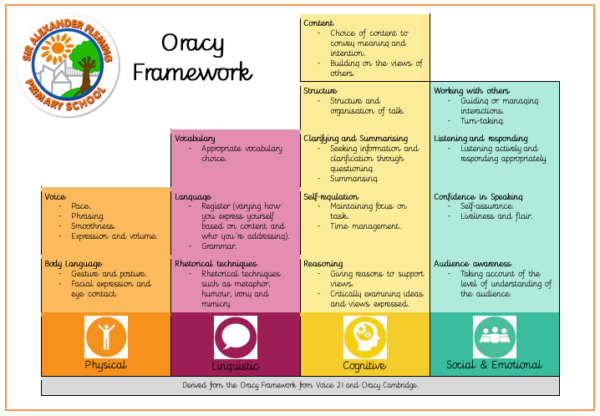“In school, oracy is a powerful tool for learning; by teaching students to become more effective speakers and listeners we empower them to better understand themselves, each other and the world around them. It is also a route to social mobility, empowering all students, not just some, to find their voice to succeed in school and life.
Through a high quality oracy education students learn through talk and to talk. This is when they develop and deepen their subject knowledge and understanding through talk in the classroom, which has been planned, designed, modelled, scaffolded and structured to enable them to learn the skills needed to talk effectively.”–What is oracy? – Voice 21
What is the intent of the Oracy curriculum at Sir Alexander Fleming Primary School and Nursery?
At Sir Alexander Fleming, our vision is to raise the opportunities and expectations for oracy within classrooms and across the curriculum. We will build an oracy culture embedded throughout the school by allowing children to express themselves in different contexts through the deliberate, explicit and systematic teaching of oracy.
We will provide an environment which allows children to feel safe and brave enabling them to seize the opportunity to become effective speakers and listeners. Providing scaffolding such as our STEM sentences, displays and modelled vocabulary allows children to feel this by giving them a starting point to build upon. These tools allow pupils to share their understanding and viewpoints while asking questions which will develop their understanding of a subject leading to success. Through continual success in their oracy skills children will begin to show pride in their spoken language and ability to engage with others in different settings. By fostering an environment where everyone can engage with oracy children will develop respect for themselves, their work and their peers.
By the end of KS2, we want all children to be effective, competent communicators and engaged listeners. They will use oracy to aid them in engaging with others and the curriculum using the tools given to them (STEM sentences, vocabulary, displays). They will be able to articulate their ideas, learn through talk (deepening their subject knowledge) and learn to talk. Children at Sir Alexander Fleming will make physical, linguistic, cognitive, social and emotional progress in their oracy (see figure below, The Oracy Framework by Voice 21).

Through the above, we will empower the pupils at Sir Alexander Fleming to be public speakers who can articulate their opinions while knowing how to question things appropriately.
What can parents and carers do to support children to develop their oracy skills at home?
Talk about their day…and yours! – The tried and tested ‘What did you do today?’ often yields a disappointing ‘I can’t remember.’ So, find different ways to talk about what your child has been up to. Eating your evening meal as a family is a great way to encourage conversation – definitely no screens on! Older children are often more chatty in the car, where they feel less like they are being interrogated.
Read aloud to your child – Reading aloud, particularly with texts that are well beyond the age that they can read for themselves, combines the benefits of talking, listening and storytelling within one activity. This helps children to build their vocabulary, learn to express their thoughts and understand the structure of language.
Ask questions – Ask your child questions about what they say and encourage them to ask you questions too! Having regular conversations with your child in your home language is also very valuable in terms of developing your child’s oracy skills so please do not worry if your first language is not English.
Phone a friend – Persuade your child to move away from simply messaging friends or relatives and develop their speaking skills by making an actual phone call. Encourage them to speak to different family members on the phone or a video call and, again, this can be done in your home language. It’s all about building confidence as a speaker.